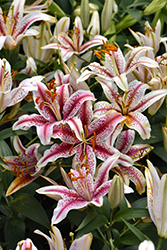Plant Height: 3 feet
Flower Height: 4 feet
Spacing: 14 inches
Sunlight:
![]()
![]()
Hardiness Zone: 4a
Group/Class: Oriental
Description:
Blooms are white with bold crimson stripes and many freckles; a stunning perennial that will return each year and even naturalize; heavenly fragrance and long bloom time and life as a cut flower make this one a winner
Ornamental Features
Dizzy Lily features bold fragrant nodding white trumpet-shaped flowers with hot pink overtones and crimson stripes at the ends of the stems in early summer. The flowers are excellent for cutting. Its narrow leaves remain green in colour throughout the season.
Landscape Attributes
Dizzy Lily is an herbaceous perennial with a rigidly upright and towering form. Its medium texture blends into the garden, but can always be balanced by a couple of finer or coarser plants for an effective composition.
This plant will require occasional maintenance and upkeep, and should be cut back in late fall in preparation for winter. Gardeners should be aware of the following characteristic(s) that may warrant special consideration;
- Insects
- Disease
Dizzy Lily is recommended for the following landscape applications;
- Mass Planting
- General Garden Use
Planting & Growing
Dizzy Lily will grow to be about 3 feet tall at maturity extending to 4 feet tall with the flowers, with a spread of 18 inches. When grown in masses or used as a bedding plant, individual plants should be spaced approximately 14 inches apart. It tends to be leggy, with a typical clearance of 1 foot from the ground, and should be underplanted with lower-growing perennials. The flower stalks can be weak and so it may require staking in exposed sites or excessively rich soils. It grows at a fast rate, and under ideal conditions can be expected to live for approximately 10 years. As an herbaceous perennial, this plant will usually die back to the crown each winter, and will regrow from the base each spring. Be careful not to disturb the crown in late winter when it may not be readily seen!
This plant does best in full sun to partial shade. It does best in average to evenly moist conditions, but will not tolerate standing water. It is not particular as to soil type or pH. It is somewhat tolerant of urban pollution. This particular variety is an interspecific hybrid. It can be propagated by multiplication of the underground bulbs; however, as a cultivated variety, be aware that it may be subject to certain restrictions or prohibitions on propagation.
Disclaimer - This resource is provided for informational purposes only and does NOT reflect current availability. Inventory varies seasonally, so we cannot guarantee that every plant will be in stock at all times - please contact your favourite GardenWorks location directly for current availability. It does not include our entire inventory of plants, so be sure to visit GardenWorks to see varieties that may not be represented on this list.

